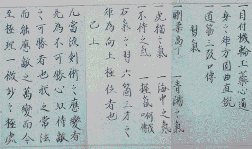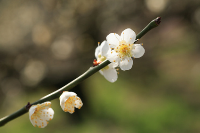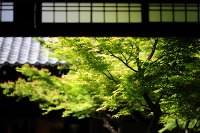Shūki 習気
The Ideals of the Spirit that a Warrior Should Attain
 The character shū 習 means “to learn or to internalize” while ki 気 means “the way the spirit ought to be, state of mind or disposition”. So Shūki 習気 is ideal state of spirit that a warrior should attain.
The character shū 習 means “to learn or to internalize” while ki 気 means “the way the spirit ought to be, state of mind or disposition”. So Shūki 習気 is ideal state of spirit that a warrior should attain.
A man may have an exceptional feeling of spirit and have a superior mastery of technique at the physical level, but if he is not is a proper state of readiness, when push comes to shove he will become upset emotionally and will not be able to use the things he understands mentally and has mastered physically there on the spot. The character shū 習 is made from the characters “wing” 羽 and “sun” 日. This means that when a young bird is learning to fly, everyday it moves it’s wings, trying over and over an endless number of times while wondering “will today be the day I take flight? Will I make progress today?” If it practices the proper form and movements until they become completely habitual, the use of the body will become internalized and the inability to fly will vanish, even if it is not consciously thinking about it. If one continues to train in this manner, always having a calm spirit and using one’s best techniques, one will not become flustered or have doubts when it matters.
Kōjūkōge 剛柔高下
The character kō 剛 means “strong” or “brave”, the character jū 柔 means “flexible”. Kō 高 means “high” in status or position and ge 下 means “low” in position. Kōjūkōge 剛柔高下 is “things that are strong and things that are flexible”, “things of high stature and things of low stature”
When the heart changes due to events or moves due to things, one is unable to follow the martial path or budō. Because bu (literally “martial” but here could used as martial arts) are techniques put resolutely into action to quickly subdue a situation, if one’s willpower is not strong, one will be unable to be decisive and accomplish anything.
On the other hand, if one’s mind is not flexible, one will not be able to quickly adapt to the enemy when facing him. Jū 柔 is to know one’s own shortcomings and use gentleness, avoiding becoming short tempered. Kō 剛 is to cultivate one’s strong points and to not feel daunted by things and panic.
A person who has cultivated both kō and jū has a bearing which is neither high (kō 高) nor low (ge 下). He is neither too noble nor too base and does everything in moderation. It is said that one such as this can put the sword aside and compose a poem, or still have the composure to pluck the strings of a koto (a Japanese stringed instrument) even while an enemy is approaching. This is because such a person has a clarity of mind that they have been able to infer naturally what will happen and decide on a suitable course of action well before the enemy advances on them.
 Seiyō-no-ki 青陽之気
Seiyō-no-ki 青陽之気
The character sei 青 means “green” while yō 陽 means “the sun”. Seiyō 青陽 means “spring”. No 之 is a possessive marker while ki 気 means “state of mind”. All together, Seiyō-no-ki 青陽之気 has the meaning of ” in the character of spring”.
Sei 青 points to spring and the second month (in modern Japanese this would be translated as February, but in Edo period Japan the second month was a little later in the year and thus closer to spring). The military man must always be clear in attitude when dealing with people and he must cultivate this brightness of attitude. Spring’s weather is mild and the blessings of life spring forth from the mountains and rivers throughout the land, wildlife of all kinds bear children, the trees and plants begin to bud and there is not one thing that arises which is inhumane. One with such a purity of spirit is abundant in wisdom, holds no prejudice, leaves nothing unfinished which he undertakes, is blessed in many things and even if he rules over people, he has no intent partake of acts like killing. This is Seiyō-no-ki 青陽之気.
Komyō-no-ki 虎猫之気
Ko 虎 has the meaning of “tiger” and myō 猫 the meaning of “cat”. No 之 is a possessive marker and ki 気 means “state of mind”. Komyō-no-ki 虎猫之気 thus has the meaning of “in the character of a tiger or cat.”
We are taught that bujin (men of the path of bu) cultivate a spirit that is deeply seated like a mountain. However we can more clearly understand this by using the example of tigers and cats. Tigers are powerful (literally “strong in the hips”) and have a long tail, but they do not disgrace themselves by stooping to lowly behavior like foxes, rather their deep seated watchfulness extends fully to their tail and they move freely. While cats are related to tigers, they differ in that they are not as strong, but the sense they have of defending themselves and that sense appearing all the way down to their tails is the same as a tiger. So while tigers and cats differ in strength, their wariness and deeply seated preparedness to defend themselves is the same and they have an this immovable character, like a mountain.
When drawing a sword, the movement of the body begins with the right shoulder, so we firmly plant the right shoulder, making it unmovable like a tiger. In other words, not drawing the sword is what is called the proper path. Not arbitrarily moving troops, not drawing the sword, sinking the hips and firming rooting oneself like a mountain, doing nothing rash, this is what is called Komyō-no-ki 虎猫之気.
 Kaichū-no-ki 海中之気
Kaichū-no-ki 海中之気
Kai 海 means “sea” and chū 中 means “in (the middle of)”. No 之 is a possessive marker and ki 気 means “state of mind”. Kaichū-no-ki 海中之気 thus has the meaning of “in the character of being in the sea.”
This is the state of mind of not breaking one’s promises, of not betraying people’s expectations, of, while cooperating with people, accepting the approaches of others to bring you into action, regardless of whether their motives are good or bad, pure or evil, and interacting with them appropriately.
The sea is vast and does not despise unclean things; it does not chose what it wants and accepts the everything that flows into it. It does not ignore the things it has received, nor interrupt the things coming in. Moving in accordance to the heaven and earth, using the example of the water in the sea rising and falling without pause, acting in accordance to the natural rationale of things is the teaching of .
Futai-no-ki 不待之気
The character fu 不 is a negative prefix meaning “to not do”, and tai 待 has the meaning of “wait”. So futai 不待 means “to not wait”. No 之 is a possessive marker while ki 気 means “state of mind”. All together, Futai-no-ki 不待之気 has the meaning of ” the quality of not waiting or hesitating”.
Having no arrangements for a guest to come, nor having no plans to go as a guest is the state of . Because a guest is coming, you wait, because you wait the guest comes. Stated another way, if there is no one waiting, a guest will not come. If one speaks nonsense to someone, one will not receive a sensible response. For example it has been said of old that if one becomes infatuated with a woman, beautiful women will appear even in your dreams and if one believes in religion, one will encounter deities that should not exist in this world. Confusion arrises when one does not firmly control one’s feelings.
Between the heavens and earth, things that hesitate and do not move die because they run counter to the true nature of things. Those that do not hesitate and act live because they follow the natural order of the world. There for those who are selfishly distrustful and doubting of this and that who will never make a decision on matters. Delaying on matters is something shouldn’t be done. This is the teaching of Futai-no-ki 不待之気.
 Akuki 握気
Akuki 握気
The character aku 握 is “to grasp” and ki 気 is “state of mind”. Therefore Akuki (or Akki) 握気 is “the nature of grasping firmly”
Aku 握 means to hold in one’s hand. For the warrior, life is unmistakably sleeping, waking, and going about one’s daily life with the understanding of the ever present dangers regarding life and death, so even if some unexpected encounter presents itself, one’s mind is not upset and deals with it as usual. In a particularly serious encounter one’s body may freeze up or one may give in to cowardice, so one must always follow the proper path and hold fast to making one’s stance that one’s sword will not be drawn. Firmly holding on to one’s convictions and having them so strong that no one is able to oppose it is what is called Akki 握気.
Do not associate with people who create disturbances and do not deal with people like those who take up weapons and swing them about. Akki 握気 is “firmly holding on to the true path” or the teaching of making the true path of not drawing the sword one’s own path. One does not take up one’s own sword and terminates a situation without using it.
Summary
A bujin is at all times mild and not short tempered, cultivates a strong spirit and does not rush things, acting neither too high nor too vulgar (Kōjūkōge 剛柔高下), is bright and clear of spirit, is thorough in all things, and is in no way inhumane (Seiyō-no-ki 青陽之気), is firmly planted like a tiger and puts their wisdom to work like that tail of a cat (Komyō-no-ki 虎猫之気).
They honor all their promises and do not betray people’s expectations, are broad minded and tolerant of all kinds (Kaichū-no-ki 海中之気), do not become puzzled or lose their ability to judge due to doubt and suspicion (Futai-no-ki 不待之気), and at all times firmly maintain in their heart that the true path is the one of not drawing the sword and do not associate with those who crave conflict (Akki 握気).




